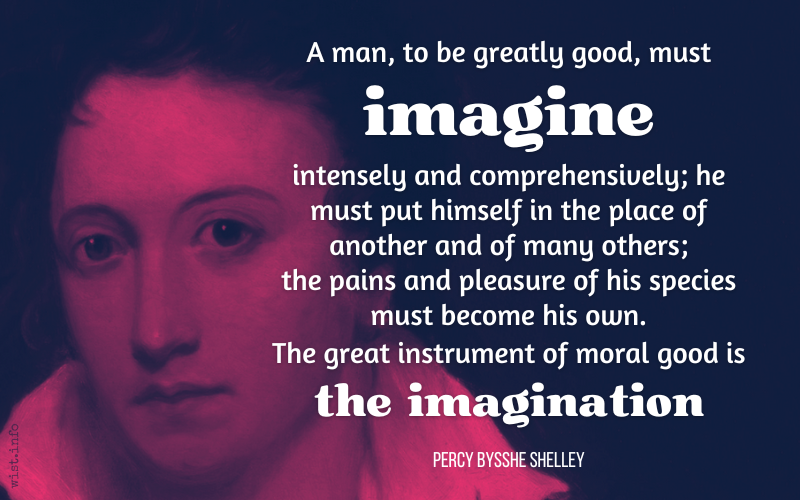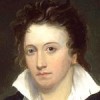A man, to be greatly good, must imagine intensely and comprehensively; he must put himself in the place of another and of many others; the pains and pleasure of his species must become his own. The great instrument of moral good is the imagination; and poetry administers to the effect by acting upon the cause.
Quotations by:
Shelley, Percy Bysshe
I met a traveller from an antique land
Who said: — Two vast and trunkless legs of stone
Stand in the desert. Near them on the sand,
Half sunk, a shatter’d visage lies, whose frown
And wrinkled lip and sneer of cold command
Tell that its sculptor well those passions read
Which yet survive, stamp’d on these lifeless things,
The hand that mock’d them and the heart that fed.
And on the pedestal these words appear:
“My name is Ozymandias, king of kings:
Look on my works, ye mighty, and despair!”
Nothing beside remains: round the decay
Of that colossal wreck, boundless and bare,
The lone and level sands stretch far away.
Love withers under constraint: its very essence is liberty: it is compatible neither with obedience, jealousy, nor fear.
Our sincerest laughter
With some pain is fraught;
Our sweetest songs
Are those that tell of saddest thought.
Hell is a city much like London —
A populous and smoky city.Percy Bysshe Shelley (1792-1822) English poet
Peter Bell the Third, Pt. III, st. 1 (1819)Full text.
Awful as silence. Hark! the rushing snow!
The sun-awakened avalanche! whose mass,
Thrice sifted by the storm, had gathered there
Flake after flake, in heaven-defying minds
As thought by thought is piled, till some great truth
Is loosened, and the nations echo round,
Shaken to their roots, as do the mountains now.
If he is infinitely good, what reason should we have to fear him? If he is infinitely wise, why should we have doubts concerning our future? If he knows all, why warn him of our needs and fatigue him with our prayers? If he is everywhere, why erect temples to him? If he is just, why fear that he will punish the creatures that he has filled with weaknesses? If grace does everything for them, what reason would he have for recompensing them? If he is all-powerful, how offend him, how resist him? If he is reasonable, how can he be angry at the blind, to whom he has given the liberty of being unreasonable? If he is immovable, by what right do we pretend to make him change his decrees? If he is inconceivable, why occupy ourselves with him? IF HE HAS SPOKEN, WHY IS THE UNIVERSE NOT CONVINCED? If the knowledge of a God is the most necessary, why is it not the most evident and the clearest?
Percy Bysshe Shelley (1792-1822) English poet
The Necessity of Atheism (1811)
Full text, 1813 ed. The text is followed by a citation of "Systeme de la Nature (1781)" (by Baron d'Holbach), but it's unclear whether, or what part of, this is being quoted by Shelley.


